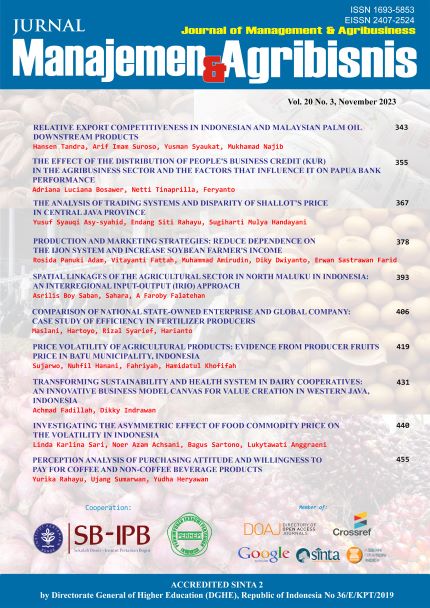Relative Export Competitiveness in Indonesian and Malaysian Palm Oil Downstream Products
Abstract
Palm oil is an important commodity between Indonesia and Malaysia with a higher contribution to the national economy. However, the investigation into its competitiveness is still important due to fierce competition in the global world. This study aims to investigate the Relative Export Competitiveness (REC) of palm oil downstream and its determinant factors between Indonesia and Malaysia from 1970 until 2020. This study utilizes REC based on merchandise trade and multiple regression by using several variables influencing its REC. The findings reveal that REC in Indonesia has been greater than that of Malaysia over the past 20 years. Initially, Malaysia had a stronger position in REC than Indonesia, particularly from 1971 to 1997. Our analysis demonstrates that REC in Indonesia is positively influenced by factors such as the palm oil policy, the existence of palm oil organizations, and the official exchange rate. Conversely, GDP per capita and the palm oil policy positively impact Malaysia's REC. However, Foreign Direct Investment (FDI) and the ASEAN Free Trade Agreement (AFTA) have a negative effect on REC in both countries. Based on these results, Indonesia and Malaysia must examine proper palm oil downstream policy to boost competitiveness.
Keywords: business analytics, determinant factor, palm oil downstream, relative export competitiveness, trade
Authors
Authors who publish with this journal agree to the following terms:
- Authors retain copyright and grant the journal right of first publication with the work simultaneously licensed under a Creative Commons Attribution License that allows others to share the work with an acknowledgement of the work's authorship and initial publication in this journal.
- Authors are able to enter into separate, additional contractual arrangements for the non-exclusive distribution of the journal's published version of the work (e.g., post it to an institutional repository or publish it in a book), with an acknowledgement of its initial publication in this journal.
- Authors are permitted and encouraged to post their work online (e.g., in institutional repositories or on their website) prior to and during the submission process, as it can lead to productive exchanges, as well as earlier and greater citation of published work (See The Effect of Open Access).

